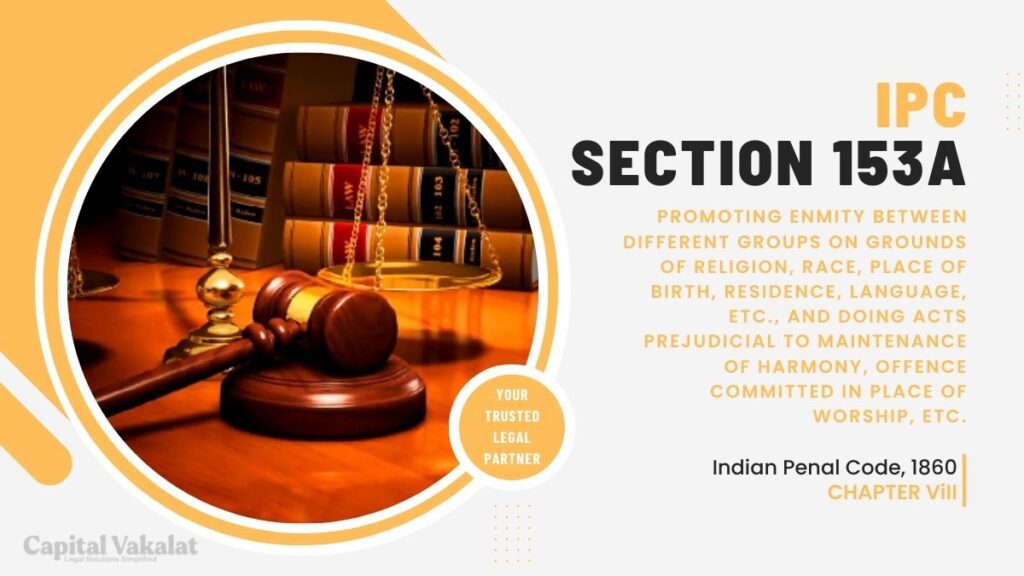Section 153A of the Indian Penal Code (IPC) addresses the grave issue of promoting enmity between different groups on grounds of religion, race, place of birth, residence, language, and more.

It also deals with acts that are prejudicial to the maintenance of harmony, especially when these offenses are committed in places of worship or religious significance.
Understanding Section 153A IPC
Section 153A IPC, a significant legal provision in India, is designed to prevent and penalize activities that can disturb communal harmony and incite violence among different groups within society. It is crucial in maintaining social order, especially in a diverse country like India.
History and Origin
The roots of Section 153A IPC can be traced back to the pre-independence era when communal tensions were at their peak. The provision was introduced to curb instances of hate speech and acts that were designed to create divisions among communities.
Key Provisions
This section of the IPC primarily focuses on acts that promote enmity, hatred, or ill-will between different groups. It prohibits actions that are meant to disrupt communal harmony and cause tension. These actions can include promoting feelings of enmity, hatred, or ill-will through words, signs, or any other means.
Offences Under Section 153A
Section 153A IPC specifies various offenses, including promoting enmity between different groups, engaging in prejudicial acts, and making statements or creating content with the intent to disrupt harmony. These offenses are taken very seriously and can lead to severe consequences.
Punishments and Penalties
The legal consequences of violating Section 153A IPC can range from fines to imprisonment. Depending on the gravity of the offense, the punishments can be substantial, reflecting the severity of promoting enmity among different groups.
Landmark Cases
Over the years, several landmark cases have set precedents for the interpretation and enforcement of Section 153A IPC. These cases have helped define the boundaries of free speech and the limits of promoting enmity.
Controversies and Criticisms
Like many legal provisions, Section 153A IPC has faced its share of controversies and criticisms. Some argue that it can be misused to stifle free speech, while others believe it’s essential to maintain social harmony.
Importance and Relevance
In a diverse and multicultural society like India, Section 153A IPC plays a pivotal role in ensuring that various communities can coexist peacefully. It emphasizes the importance of respecting differences and promoting unity.
Promoting Harmony
Promoting harmony is at the core of Section 153A IPC. It serves as a reminder that unity and social cohesion are essential for the progress and well-being of any nation.
Offence in Place of Worship
One significant aspect of Section 153A IPC deals with offenses committed in places of worship. This recognizes the sensitivity of religious locations and aims to protect them from acts that could incite violence.
Legal Interpretations
The legal interpretation of this section is vital in maintaining a balance between free speech and preventing hate speech. Courts play a significant role in shaping how this law is applied.
Safeguarding Freedom of Speech
While Section 153A IPC is necessary to protect communal harmony, it’s equally important to safeguard the freedom of speech. Finding the right balance is an ongoing challenge for lawmakers and the judiciary.
Challenges and Enforcement
The effective enforcement of Section 153A IPC poses its own set of challenges, especially in a country as diverse as India. Ensuring that the law is applied fairly and consistently can be a complex task.
Conclusion
In conclusion, Section 153A IPC is a critical legal provision in India that aims to prevent and penalize activities that can disrupt communal harmony. It’s a delicate balance between safeguarding freedom of speech and maintaining social order. By understanding its key provisions and significance, we can work towards a more harmonious society.
Frequently Asked Questions
Can Section 153A IPC be used to suppress free speech?
While it aims to prevent hate speech and activities that disrupt harmony, there is an ongoing debate about finding the right balance between maintaining social order and safeguarding freedom of speech.
What are the legal consequences of violating Section 153A IPC?
Depending on the gravity of the offense, the punishments can range from fines to imprisonment.
How does Section 153A IPC address offenses in places of worship?
Section 153A IPC recognizes the sensitivity of religious locations and aims to protect them from acts that could incite violence.
What challenges exist in enforcing Section 153A IPC?
Ensuring that the law is applied fairly and consistently, especially in a diverse country like India, poses challenges in its enforcement.